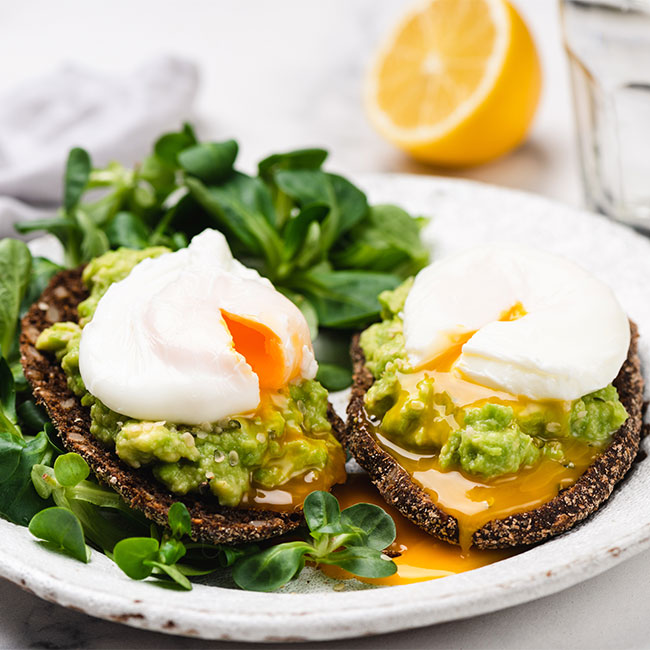How you start off your morning matters when it comes to not only your overall health, but also your ability to lose or maintain weight. If your goal is to prevent weight gain, indigestion, inflammation, and prioritize your gut health, we’ve got you covered. We checked in with doctors, nutritionists, dietitians and other health experts for three common morning mistakes to avoid for a healthier metabolism and digestion. Read on for tips, suggestions and insight from Dr. Daniel Boyer, MD, health expert and writer at Farr Institute, Dana Ellis Hunnes, PhD, MPH, RD, senior dietitian at UCLA medical center, and Lisa Richards, registered nutritionist and creator of The Candida Diet.
The 100+ Best Beauty Launches Of 2022
Shutterstock
1. Skipping Breakfast
You may have heard time and time again that breakfast is the “most important meal of the day,” and it’s worth repeating, Boyer says, because it’s true. “Make sure to eat breakfast after waking up,” he stresses, as “skipping breakfast can lead to blood sugar spikes and hormonal imbalances that can cause bloating and inflammation.” By making time to have a daily breakfast, he notes, you are instantly promoting a healthier, more consistent digestion. Becoming hungry just after waking up, and satisfying this, is a great sign of a healthy metabolism, Boyer explains. In addition, he suggests “opting for a whole grain-rich breakfast with protein and fiber to keep you feeling full longer and prevent cravings later in the day.” This will also help prevent weight gain, he adds.
Shutterstock
Fruits that are “low in sugar and high in fiber,” are a great place to start when planning your first meal of the day. “Fruits low in sugar can help prevent blood sugar spikes that can lead to bloating and cravings later in the day, while high-fiber fruits help promote healthy digestion and regularity (which can also lead to less bloating),” Boyer continues. Some examples of these fruits that Boyer lists include “berries, apples, pears, plums, peaches, figs, kiwis, coconuts, and bell peppers.”
Shutterstock
2. Eating Sugary Pastries
As noted before, your breakfast is crucial regarding your energy levels for the rest of your day, so choosing a sugary pastry, cereal, or other treat for your first meal will lead to energy crashes and hunger later on, Hunnes warns. This, she stresses, can also lead to weight gain as you will feel the need to satisfy cravings when not initially satiated from your breakfast. The worst breakfast choice when it comes to inflammation and weight gain, Hunnes says, are sugary pastries made with refined carbohydrates. “The least healthy type of carbohydrates to eat are ultra-processed carbohydrates that are frequently found in packaged foods such as pastries like Pop-Tarts, energy bars, and pastries,” Hunnes explains.
Shutterstock
“The reason these types of carbs are not great at any age, let alone over 40, is because they provide no nutritional benefit, they are often devoid of vitamins and minerals, antioxidants, and anti-inflammatory compounds,” she continues. This is terrible for the metabolism, Hunnes urges, because it leads to “insulin spikes, increases in IGF-1, an inflammatory marker, and increases risk for chronic diseases and deposition (fat storage)” of calories in the body. If you still want the taste of something sweet in the morning, she recommends adding your favorite “fiber-filled fruit” to your “bowl of oatmeal,” as “fiber can prevent and reduced inflammation by keeping the G.I. track moving.” It does this, she says, by “attracting water into the gut and making the waste softer with more fluid, thereby making it easier to pass.”
Shutterstock
3. Adding Heavy Creamers/ Sweeteners to Your Coffee
Coffee on its own, Hunnes says, is great for your metabolism and digestion, as drinking it in the morning can “help with bloat because it encourages peristalsis of the gastrointestinal tract,” and encourages consistent, stable, and comfortable digestion. In addition, Boyer adds that a cup of black coffee is also filled with “healthy antioxidants,” and its caffeine can provide much needed energy to start your day. However, Richards warns, adding a sugary creamer or lots of sweeteners can add extra calories that can set back your weight loss progress, and lead to indigestion and inflammation. “Adding milk or creamer to coffee is a practice done by most coffee drinkers to enhance the flavor and creamy nature of the often bitter and acidic drink,” she acknowledges, noting that “while it is common, adding creamer is also a way calories, sugar, and fat sneak into our diet and it adds up quickly.” While Richards points out that this isn’t to say that everyone should drink their coffee black, it may be beneficial to avoid certain coffee creamers.
Shutterstock
She advises to “always read the nutrition and ingredient labels for fat, calories, and added sugar.” Ideally, Richards suggests that it is best to avoid any added sugar, but 1-2 grams should be your limit. Additionally, Richards tells us that refined sugar, which is commonly called table sugar, is a type of sugar that is harmful to your gut and weight for many reasons. “This type of sugar is sucrose, and is highly inflammatory as well as a food source for bad gut bacteria,” she says. Richards continues that “inflammation and an overgrowth of harmful gut bacteria will result in negative health effects in many areas of the body.” While it can be found naturally occuring, the synthetic or commercially made sugar should be “avoided as much as possible.” For those that need their coffee sweet, monk fruit can be a great option, she recommends. “Monk fruit extract contains some incredible compounds that are 300-400 times sweeter than cane sugar,” Richards concludes, and here’s the real kicker, it’s “virtually calorie-free.” That means it “won’t affect blood sugar levels, and it won’t rot your teeth.” Good to know!





